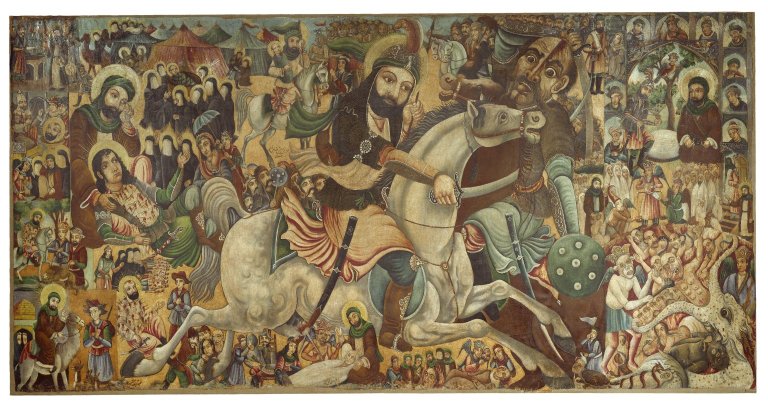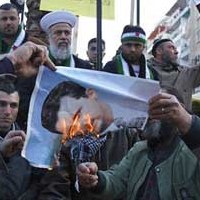![]()
Sun, Nov 4, 2012 | RubinReports | By Barry Rubin

The Battle of Karbala (October 10, 680 in present day Iraq): Imam Hussein Depicted at Karbala, site of a schismatic battle between a small group of supporters and relatives of Muhammad’s grandson Husain ibn Ali (Shiites), and a much larger military detachment from the forces of Yazid I, the Umayyad caliph (Sunnis), whom Hussein had refused to recognise as caliph. Hussein and all his supporters were killed. The battle has a central place in Shi’ah history and tradition. (by Abbas Al-Musavi / C.1900 / Brooklyn Museum)
Once upon a time, Arab nationalism ruled the Middle East. Its doctrine saw Arab identity as the key to political success. Some regarded Islam as important; others were secular. Yet there was no doubt that national identity was in charge. All Arabs should unite, said the radical nationalists who ruled in Egypt, Libya, Syria, Iraq, and elsewhere, to destroy Israel, expel Western influence, and create a utopian single state in the region.
Instead, of course, the period was characterized by battles among the radical Arab states for leadership. The less extreme ones sought survival through a combination of giving lip service to radical slogans, paying off the stronger regimes, and getting Western help.
That era is over. We are now in the era of Sunni Arab identity and especially of Sunni Arab Islamism. With the liberals so weak, except possibly in Tunisia, the three main choices are between the Muslim Brotherhood; the Salafists; and conservative-traditional forces (as in Iraq, Saudi Arabia, and Jordan) that will have some Islamic flavor but not seek to be destabilizing and aggressive in the region.
Sunni Arab Islamist identity’s primacy has important implications for both national and regional politics.
First, tolerance for other groups is low to zero. The future of Christians in the Middle East is dim. Already, most have been driven out of Iraq and the Gaza Strip. If Christians in Syria and Egypt — comprising more than ten percent of the population in each country — could find somewhere to go, it is quite possible that hundreds of thousands will be leaving in the coming years. Were the rebels to come to power in Syria, the Alawite minority — which has largely ruled the country for the past four decades — also faces serious threats to its existence.
Second, the regional ambitions of Turkey’s Islamist regime will come to nothing. There is a deep resentment against Turks among many Arabs and especially the Islamists. Hamas and Hizballah will take Turkish aid but will give Ankara no influence over themselves. Any influence the Turkish regime has over the Syrian rebels would not survive a victory for the revolution.
Third, this situation is a severe setback for Iran. A few years ago it was possible to believe that Tehran had a shot at achieving regional hegemony. But the Sunni Arab Islamists generally despise Shia Muslims, and the new Arab leaders don’t feel warmly inclined toward Persians either. In Iraq, circumstances—including a military defeat and minority status — have forced the Sunni Muslims to accept a Shia — dominated government. That won’t happen anywhere else. Iran is down to just three potential allies: the faltering Syrian regime; Hizballah in Lebanon; and, on some issues but especially confronting Sunni Muslim hostility to Shia Muslims, Iraq. It is likely to lose Syria but that very outcome might push Iraq and Iran closer together against a hostile Sunni bloc. That doesn’t mean Baghdad will become a satellite of Iran, an active enemy of the United States, or an equally radical state, but the two will increasingly cooperate.
Within the Sunni Arab Islamist world, the groups that we call Salafist for convenience — smaller organizations that demand full revolution now — compete with the Muslim Brotherhood but the two can also work together. Their goals are the same; their sense of timing, not to mention clashing personal and group ambitions for power, are different. Even today, the Muslim Brotherhood rules only in Egypt and the Gaza Strip, as well as leading a coalition in Tunisia. Their prospects are good in Syria but not in Jordan. We should not overstate the group’s power though, of course, Egypt is the single most important Arab state.
The Brotherhood leadership, in Egypt and potentially in Syria, will have an important decision to make. They will definitely not become moderate. There is no doubt that they will institute repressive regimes at home, harass Christians, and reduce the status of women. They will also daily trumpet their hatred of the United States and Israel.
But what will they do about that hatred? It is probable that they will, in practice, permit their territory to be used for cross-border attacks on Israel. They might well prefer, however to avoid a direct conventional war. On this point, however, they will constantly be goaded by the Salafists. To provide a parallel example note that the Brotherhood generally does not launch violent attacks on Christians in Egypt but doesn’t lift a finger to protect them. A lot of their energy, though, will go into battling the Shia and after Syria is settled, however long that takes, the main battleground will be Lebanon. When Damascus sneezes Beirut catches cold. A Muslim Brotherhood-dominated government in Syria would not back the current moderate Sunni Muslim leadership in Lebanon but instead promote radical Sunni Islamist groups there. The probability of a Sunni-Shia war in Lebanon would be high.
If one regards Iran as the main threat, the temptation would be for the West to back the Sunni side. I think this would be a tremendous mistake. Aside from the nuclear issue, the danger from Iran has been massively reduced by these changes. Even if Tehran has nuclear weapons, the main danger in the Arabic-speaking world is going to come from the radical Sunni forces simply because they constitute a large majority there. After all, the battle on the ground for control of Arabic-speaking countries will go on every day whereas Iran can only decide to use nuclear weapons once (and of course might face an Israeli attack).
Further, and keep in mind that Iran’s regime is less irrational than many people think, the strategic value of attacking Israel has declined greatly. Nobody new would rally to Tehran’s side because of such an attack. The door to the Sunni world has been shut against Iran no matter how much its leaders scream about Palestine and make threats — or implement them — against Israel. Will the Sunni and Shia sides cooperate against Israel? No, not directly. The Turkish regime will give some help to Hizballah; Iran will give some help to Hamas. Yet there will be no broader alliance.
We are not just talking here about theological differences but a battle between individual leaders, organizations, and states for power and primacy. Of course, though, they will compete in proving that they are the true leaders in the anti-Israel struggle. And the same point applies regarding opposition to the United States, too.
This is a complex situation requiring a sophisticated and determined American leadership that never feels guilty or inferior in the face of radical hatred or subversion. Only one presidential candidate is capable of handling this difficult and threatening situation. It is not the incumbent.
Barry Rubin is director of the Global Research in International Affairs (GLORIA) Center and editor of the Middle East Review of International Affairs (MERIA) Journal. His latest book, “Israel: An Introduction“, has just been published by Yale University Press. Other recent books include “The Israel-Arab Reader” (seventh edition), “The Long War for Freedom: The Arab Struggle for Democracy in the Middle East” (Wiley), and “The Truth About Syria” (Palgrave-Macmillan). The website of the GLORIA Center and of his blog, Rubin Reports. His original articles are published at PJMedia.



 RSS
RSS










Latest Comments
Hello Mike, Thank you for your positive feedback to the article. I felt there wasn’t too much critical analysis of ...
Thanks for this considered and well constructed article. A follow up article on the manner in which the editorial contro...
THE CLUELESSNESS OF CLAIMING THAT OBAMA'S MIDDLE EAST POLICIES WERE A FAILURE CANNOT BE FURTHER FROM THE TRUTH, WHAT THE...
As long as Obama is the president of the usa do not trust the us government......
Thank you for an good read....